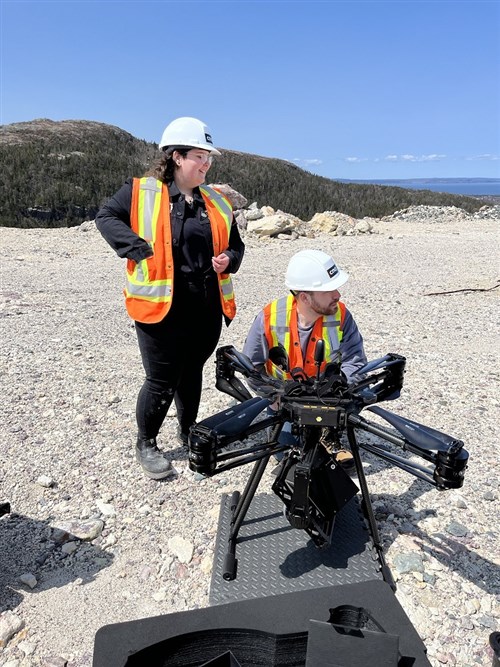STEPHENVILLE, NL – The Natural Sciences and Engineering Research Council of Canada (NSERC), in collaboration with the
Canadian Institutes of Health Research (CIHR) and the
Social Sciences and Humanities Research Council (SSHRC), is pleased to announce a total funding of $18 million over the next five years, awarded to 16 Technology Access Centres (TACs).
College of the North Atlantic (CNA) has been awarded $1.75 million over five years to establish a Reality Capture and Digitization TAC, one of four new centres that will be created throughout the country.
This funding, which will also be used to build on the support of existing centres, is provided through the
College and Community Innovation (CCI) program’s 2022
Technology Access Centre (TAC) grants.
 NSERC has just announced that College of the North Atlantic (CNA) has been awarded $1.75 million over five years to establish a Reality Capture and Digitization TAC, one of four new centres that will be created throughout the country. Shown are Charlie Dalton, CNA’s Cartographic Technician, with John Miller, applied research intern and graduate of the GIS Specialist program in Corner Brook.
NSERC has just announced that College of the North Atlantic (CNA) has been awarded $1.75 million over five years to establish a Reality Capture and Digitization TAC, one of four new centres that will be created throughout the country. Shown are Charlie Dalton, CNA’s Cartographic Technician, with John Miller, applied research intern and graduate of the GIS Specialist program in Corner Brook.
Technology Access Centres are specialized centres of expertise that offer timely innovation support to organizations from the private, public, health care or not-for-profit sectors in a college’s community. TACs provide capabilities that serve these organizations’ applied research and innovation needs. These centres address innovation challenges by enabling the organizations in their communities to take advantage of the college’s expertise, technology and equipment, leading to beneficial business, social and health outcomes for Canada.
“For over a decade, Technology Access Centres have firmly established themselves as catalysts of innovation for organizations from a range of sectors, playing a pivotal role in shaping Canada's innovation culture,” said Prof. Alejandro Adem, FRSC, President, NSERC. “On behalf of the Tri-agency, I applaud the invaluable contributions of Technology Access Centres. These extend beyond the support of innovation projects with Canadian small- and medium-sized enterprises and other organizations in their communities, to also nurturing cutting-edge expertise among students.”
In the case of CNA, its Office of Applied Research and Innovation (OARI) has actively engaged its world-class terrestrial and airborne LiDAR (Laser Imaging Detection And Ranging), 3D mapping, and hyperspectral assets and teams to advance a specialization in reality capture and digitization.
Dr. Mike Long, CNA’s Dean of Applied Research & Innovation, says the TAC will allow the college to enhance successful strategic partnerships with the mining sector and expand reality capture and digitization applications to other sectors, particularly health care, forestry, utilities, construction, tourism, energy and environmental monitoring.
“NSERC’s support for CNA’s Reality Capture and Digitization Technology Access Centre represents the coming of age for applied research and innovation at the college,” said Long. “We have leveraged our exceptional geomatics and reality capture expertise and technologies to engage with our industry and community partners to assist them on their technology adoption initiatives. Our goal is to foster the digital maturity of our partners through applied research that uses our extensive suite of LiDAR, photogrammetry and mobile mapping systems. This news is especially meaningful to our students, who will be front and centre as we develop them as the next generation of reality capture technology users and integrators. At the same time, this will fulfill an urgent need to advance this capability across all sectors with the availability of more highly qualified personnel.”
For more information about today’s announcement, visit:
NSERC News
To learn about CNA’s programs and services, visit:
www.cna.nl.ca
-30-
Media contact:
Michelle Barry
Communications Manager
College of the North Atlantic
709-643-7721
Michelle.barry@cna.nl.ca
Additional information:
- The CCI program has five distinct grant types to support colleges in having strong foundations for applied research, specialized centres in areas of identified need, and research projects driven by partner and societal needs: Applied Research and Development grants; Applied Research Tools and Instruments grants; College and Community Social Innovation Fund; Mobilize grants and Technology Access Centres.
- Among other fields of expertise, the recipient centres will provide services to partners and help fulfill local research and innovation needs in advanced manufacturing, artificial intelligence, management of rainwater and dairy production.
- As part of this project, CNA will conduct applied research and development programs with its partners to identify optimal use cases for advanced reality capture and digitization instruments and then conduct trials to determine where such technologies can be placed for the greatest impact. This would, in turn, de-risk technology adoption for the college’s partners and offer training to students and graduates from a broad scope of programs, as well as its partners.
- “Reality capture” is used to describe the process of scanning any space or object in our built or natural environment and then converting the scanned digital data into models and visualizations that are used for design purposes across virtually every sector of the economy. From 3D scans of entire marine vessels, aircraft, and buildings to support maintenance and repair to the mapping of coastal terrains to monitor climate change mitigation, “reality capture” is an advanced digital approach to knowing the world and imaging its future.